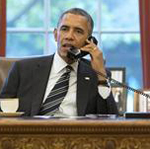 The Hill: The Obama administration faces a major test of its foreign policy later this month as negotiators push to complete a deal that would prevent Iran from obtaining nuclear weapons. A July 20 deadline for completing the deal is fast approaching. And regardless of whether there’s a deal, no deal or an extension of talks, Congress may threaten to impose more sanctions on Iran.
The Hill: The Obama administration faces a major test of its foreign policy later this month as negotiators push to complete a deal that would prevent Iran from obtaining nuclear weapons. A July 20 deadline for completing the deal is fast approaching. And regardless of whether there’s a deal, no deal or an extension of talks, Congress may threaten to impose more sanctions on Iran.
The Hill
By Cristina Marcos
 The Obama administration faces a major test of its foreign policy later this month as negotiators push to complete a deal that would prevent Iran from obtaining nuclear weapons.
The Obama administration faces a major test of its foreign policy later this month as negotiators push to complete a deal that would prevent Iran from obtaining nuclear weapons.
A July 20 deadline for completing the deal is fast approaching. And regardless of whether there’s a deal, no deal or an extension of talks, Congress may threaten to impose more sanctions on Iran.
That will be a problem for the White House, which fears new sanctions would sink any hopes for a deal that could be the best chance for a foreign policy win in President Obama’s second term.
Anthony Cordesman, a national security analyst at the Center for Strategic and International Studies, said the fact that July 20 is closer to the midterm elections increases the likelihood that members of Congress would engage in sanctions saber-rattling toward Iran.
“That sometimes leads to action that is more concerned with domestic problems than with the complexity of arms control and U.S. strategic interests,” Cordesman said. “You may get a rush to sanctions and a lot of rather loud posturing.”
Obama has a lot at stake in the talks.
The president has made improving relations with Iran a goal for his team, and in September he spoke by phone with Iranian President Hassan Rouhani, which marked the most significant direct contact between the two countries in nearly three decades.
Obama’s most significant accomplishment on defense and international affairs in his first term was the capture of Osama bin Laden. But his second term so far has arguably been more difficult on foreign policy with Syria, Ukraine and, in recent weeks, Iraq.
The odds for an accord with Iran remain tough. It is possible that negotiations between Iran and the U.S., Germany, France, Britain, Russia and China will simply be extended further if no deal is reached within the next few weeks.
The White House has so far succeeded in holding back the threat of sanctions.
Senate Foreign Relations Committee Chairman Bob Menendez (D-N.J.) and Sen. Mark Kirk (R-Ill.) late last year pushed for a bill that would tighten sanctions on Iran’s petroleum and mining industries, in defiance of the White House. The bill currently has 59 cosponsors, including 16 Democrats.
“It’s my view that the international sanctions regime has been the single most influential determinant in keeping the Iranians at the negotiating table,” Menendez said at a June Senate Foreign Relations Committee hearing on a potential nuclear deal with Iran.
A spokesman for House Foreign Affairs Committee Chairman Ed Royce (R-Calif.) did not respond to a request for comment on whether a similar effort for sanctions would move forward in the House.
The White House has warned that imposing additional sanctions on Iran would torpedo the negotiations. Under the current agreement, Iran is relieved of sanctions in increments while international negotiators work toward a long-term deal on the country’s uranium enrichment program.
In the event an accord is reached with Iran, any permanent agreement to lift sanctions would need approval from Congress, which will also be tough.
The U.S. and other countries want Iran to scale back its capacity for uranium enrichment to prevent it from building a nuclear bomb. But Iran says it needs the capacity to build nuclear power plants.
In a defiant YouTube video released Wednesday a day before the resumed negotiations in Vienna, Iranian Foreign Minister Mohammad Javad Zarif denied that the economic sanctions in place for decades had brought Iran to the negotiating table.
“It didn’t bring the Iranian people to kneel in submission. And it will not now, nor in the future,” Zarif said.
But Zarif said that Iran would be willing to demonstrate that its nuclear program was not intended to build a bomb.
“We are willing to take concrete measures to guarantee that our nuclear program will always remain peaceful,” Zarif said.
Secretary of State John Kerry said an extension could only be granted if Iran indicates a real desire to negotiate and not just stall international efforts.
“There may be pressure to put more time on the clock,” Kerry wrote in The Washington Post on June 30. “But no extension is possible unless all sides agree, and the United States and our partners will not consent to an extension merely to drag out negotiations. Iran must show a genuine willingness to respond to the international community’s legitimate concerns in the time that remains.”


